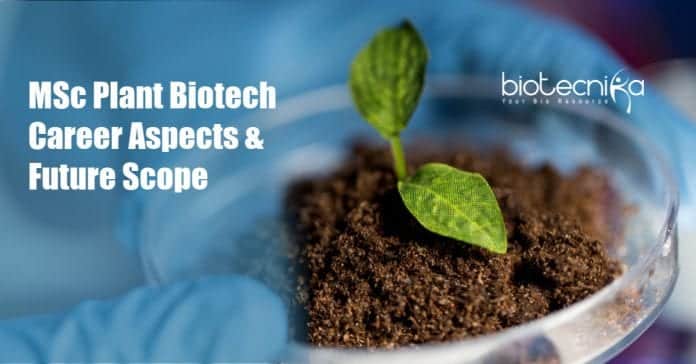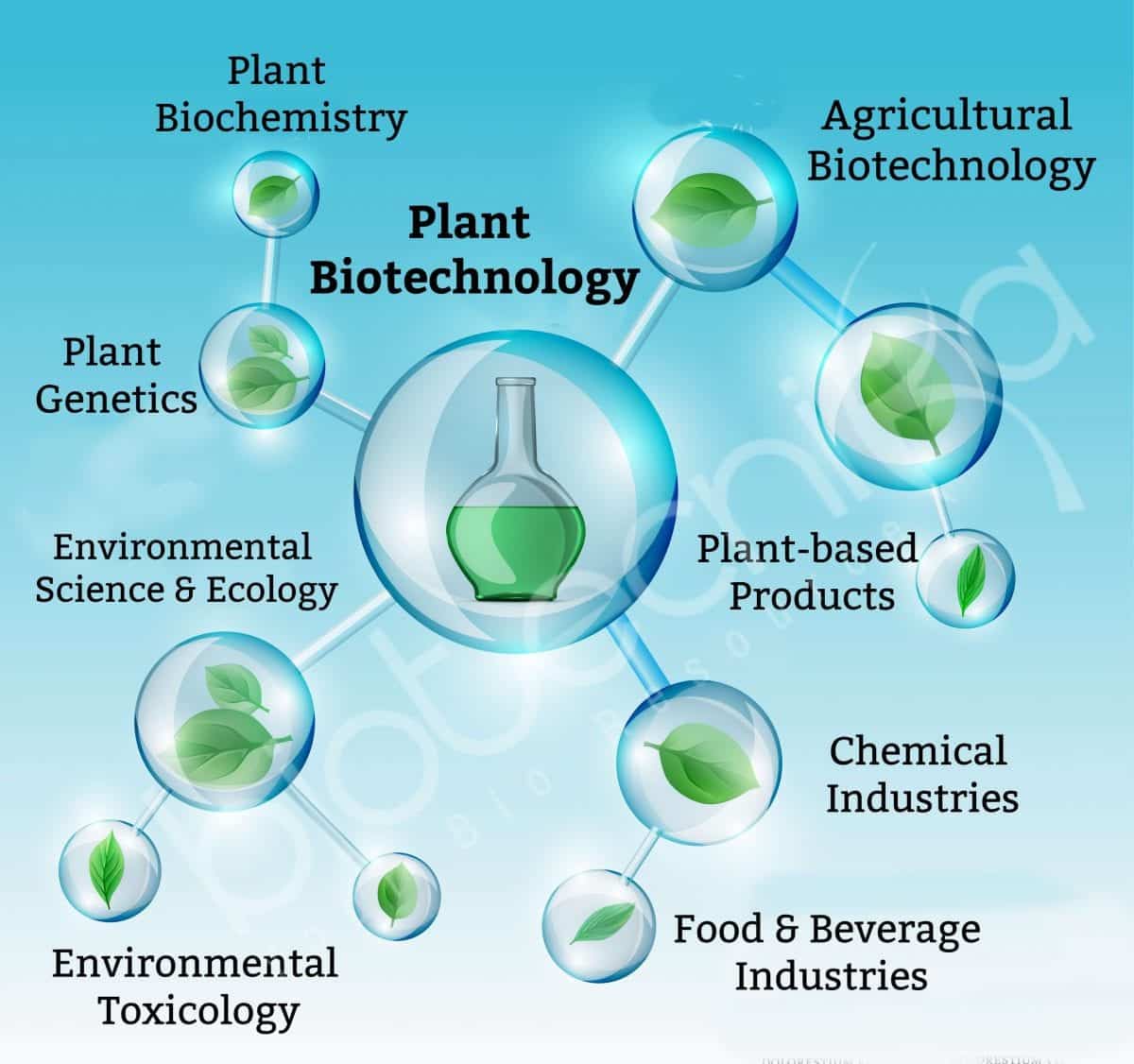MSc Plant Biotechnology Career & Future Scope
Biotechnology, one of the most radical and advantageous scientific advances, has been making continual progress since the last decade and a half. The hallmark of this interdisciplinary field is that it amalgamates several theoretical as well as the technical fields together to utilize the technologies to either generate a novel product or improvise an existing one to expand its benefits across the society. It incorporates not only fundamental aspects of mathematics, chemistry, physics, botany, zoology, genetics, molecular biology, biochemistry, embryology, cell biology, immunology, but also the practical tools extracted from streams like chemical engineering, information technology, nanotechnology, robotics, etc.
Owing to this diverse profile, it can have widespread applications across multiple disciplines associated with bio products, food and nutrition, textiles, chemical, environment, animal sciences, agriculture, and many more with a promise of offering ample opportunities to the aspirants in the upcoming future. Across the world, numbers are reflecting an increasing trend for the students who show immense interest in various streams of biotechnology as it offers both technical and practical elements reaching a plethora of opportunities.
Let us initiate our expedition from discovering more about Biotechnology!
“Biotechnology is technology advancements established on biology.”
If we go by the textbook definition of biotechnology, then Biotechnology can be defined as “The use of biological systems, living organisms or their parts to make technological advances in the welfare of the society. Nevertheless, it includes both the applications which employ living organisms and any other domain where the application of the information derived from the biological aspect of an organism is being used.
Who are the typical employers of biotechnologists?
A biotechnologist can expect imminent opportunities in various:
- Research organizations
- Universities /Colleges/ Academic institutes
- Biotechnological companies
- Pharmaceutical and chemical companies
- Agricultural and crop production companies
- Food and beverage companies
- Hospitals and other medical organizations
What skills must one have to adopt a career in Biotechnology?
Once you are targeted and poised, you are anticipated to boost a few attributes to work as foundation stones to gain a balanced success. One must possess, if not all, but most of the following skills to excel in the Biotech sector.
- Quick learning abilities
- Complex problem-solving approach
- Efficiency to work as a team player with excellent communication skills
- A dynamic personality
- An investigative and creative mind
- Innovative and creative thinking
- Management and Analytical skills
- Flexibility having the ability to adapt to changes
- Firm desire to attain success in career
Among the major streams of biotechnology, Plant Biotechnology has shown tremendous growth over the last few decades and illuminates the lives of many by offering abundant career prospects besides helping to confront daunting food challenges in developing countries like India. Thus it is evident that your career after MSc Plant Biotechnology will surely be bright with numerous Msc Plant Biotechnology Jobs waiting to be filled!
Plant Biotechnology, inseparable from Agriculture biotechnology!
Interestingly all living organisms on earth are capable of improvising evolutionally by natural mechanisms accentuating the features which support them in adapting to the varying environmental conditions. Apparently, these changes are very sluggish and may take numerous years to get accomplished. However, man has evolved abilities to exploit beneficial attributes within living beings by utilizing various scientific tools, including robust biotechnological approaches. In the same context, researchers have developed crops and domesticated animals according to the likings and requirements of human society.
Agricultural Biotechnology is a broader term used about crop and livestock improvement by utilizing biotechnological techniques. Modern agricultural biotechnology can be more precisely defined as an assortment of tools employed by scientists to recognize and manipulate the genetic make-up of the living organisms for applications benefitting the production or processing of agricultural products.
Why should Plant biotechnology be discovered more?
In today’s world, though farmers are performing the best in the fields producing more food for the consumers than ever, they would be unable to match up with rising demand against the exploding populations worldwide. Using the same water resources or even lesser, more food should be grown in the upcoming years. Demand for these situations sets the stage for multiple necessities and opportunities where a single crop may be expected to provide extraordinary yields with healthful nutrition produced in an environmentally friendly manner, bringing decent incomes to the farmers, creating maximum opportunities for employment.
Career after MSc Plant Biotechnology with various fields offering Msc Plant Biotechnology Jobs:
Meeting up all these demands is certainly an overly complex challenge confronted by researchers working in the field of plant biotechnology, which offers a collection of techniques applied to modify plants for specific requirements.
Paybacks of “Plant biotechnology” in Agriculture!
Biotechnology is being utilized to resolve glitches related to agricultural production and processing which include accomplishments made in the field of plant biotechnology like
- To upgrade the nutritional content of foods like producing plants offering antioxidant-rich food
- To elevate and stabilize yields by producing genetically modified plant species
- To expand pest resistance in plants
- To enhance resistance against abiotic stresses like drought and cold
- To increase disease resistance in plants
- To accelerate the breeding programs for plants.
There are abundant rousing and promising research studies manifesting the outcomes of plant biotechnology that should provoke and encourage more students to elicit a career in the field of plant biotechnology who are focused to bestow society with benefits.
Tools implemented in Plant biotechnology
- Traditional plant breeding methods including mutational breeding and establishment of pure lines
- Tissue culture and micropropagation
- Molecular breeding or marker-assisted selection
- Genetic engineering and development of Genetically modified species
- Molecular Diagnostic Tools
These techniques allow scientists to locate and map genes, find their functions, make gene selection, and perform gene transfer techniques.
Universities / Colleges offering plant biotechnology
Following is a suggestive list of universities and other institutes offering Masters in plant Biotechnology:
- TERI School of Advanced Studies; New Delhi
- Banaras Hindu University; BHU, Varanasi Uttar Pradesh
- University of Agricultural Sciences – Bangalore
- University of Agricultural Sciences; Dharwad, Karnataka
- University of Horticultural Sciences (UHS), Bagalkot, Karnataka
- Mahatma Gandhi Mission Institute of Biosciences and Technology; Aurangabad, Maharashtra
- University of Hyderabad; Andhra Pradesh
- Mar Athanasios College for Advanced Studies; Kerala
- Maharaja Co-Education College of Arts and Science College; Tamil Nadu
- Thiruvalluvar University; Tamil Nadu
- Punjabi University; Patiala Punjab
- Sam Higginbottom Institute of Agriculture Technology and Sciences – SHIATS; Allahabad, Uttar Pradesh
- Indian Agricultural Research Institute (IARI); New Delhi offers master’s degrees in a variety of plant biotechnology related streams like Agricultural Chemicals, Seed Science and Technology, Agricultural Engineering, etc. Refer the following link to have an insight into various courses being offered by IARI: http://entrance-exam.net/eligibility-requirements-for-msc-courses-at-iari/
- Indian Council of Agricultural Research (ICAR ) conducts ICAR AIEEA( All India Entrance Examination exam ) to shortlist aspirants for admission in undergraduate, postgraduate, and doctoral programs in agriculture and allied sciences. Refer the following link to know the criteria and other details regarding the entrance exam: https://icar.nta.nic.in/WebInfo/Public/Home.aspx
What does this course consist of?
Master of Science in Plant Biotechnology is a postgraduate course related to Agriculture Science and Technology. Plant Biotechnology augments conventional plant breeding, the most advanced tools and techniques starting from the tissue culture up to the use of molecular markers.
The duration of this course remains two academic years for most of the universities but may vary slightly from institute to institute. However, the minimum time to complete the course is two years. The course remains available both as full time and part-time, usually divided into four semesters.
Eligibility for admission to course
- Every University/ College/ Institute has its own criteria for admission, for which you are required to check the details on the organization site. Most of them conduct an entrance exam for the admission procedure.
- The general requirement is graduation in science stream related to or equivalent to life sciences from any registered University.
Skills you are expected to possess to step into the field of Plant biotechnology
- You must be willing to undertake research in and as your career.
- You must have a perspective of understanding the needs of the industries and companies who deal with the plant-based products on plant manipulation.
- You are expected to have wrought knowledge of basic laboratory techniques employing biotechnological approaches.
- It is preferred to have a conceptual understanding of the fundamental aspects of biotechnology, especially associated with molecular and biochemical subfields.
How will MSc Plant biotechnology strengthen your knowledge level?
This course will provide you an insight into all concepts and techniques applied in the field of Plant biotechnology with their extension to the production of improvised field crops. This constitutes far more than learning conventional plant breeding or genetic engineering only.
Genomics is revolutionizing the world with the knowledge at the level of genes where the scientists have proficiently delivered the Human Genome Project targeted at identifying all the genes present as the genetic constitution of humans. Thus, Genomics unlocks new horizons for marker-assisted breeding in plants.
This course will assist you in understanding how all these potential techniques can be complemented with each other to produce radical results in the field of the agricultural industry, which is undoubtedly the major industrial sector for our country.
You will find yourself growing and getting expertise with some of the powerful techniques like Plant tissue culture; a superlative in vitro model of the tissue in a distinct environment that can be easily manipulated and evaluated, Gel Electrophoresis; another widely used technique in modern biotechnology, PCR, ELISA, Western Blotting, Mass spectrometry, molecular cloning techniques, and bioinformatic and statistical-based tools.
Where may you seek employment after the course completion?
- Reputed Institutes like IARI, ICAR offer various positions like Junior or senior research fellow to postgraduates with plant sciences. Research labs in the private and industrial sectors are equally approachable.
- You can also pursue a doctorate in the same, following fellowship programs offered by government bodies like CSIR, UGC, DBT /DST, or internal fellowships offered by several universities. The following link (sourced DST) can be visited to refer to a list of evocative Institutes in India offering different areas of research, which might give you an opportunity to excel with your skills: http://dst.gov.in/sites/default/files/ANNEXURE-I%20-List-of-Indian-institutions.pdf
- Academic institutes are always open to offer the lectureship.
- Certainly, the agriculture-based Industries, food industries, beverage industries will be offering you job prospects. Chemical Industries also offer employment for plant biotechnologists. Aquaculture Industries may also provide openings to plant techniques expertise.
- Plants have been used as a potential source of drugs since ancient times over the entire globe. Even in today’s world, plant-derived pharmaceuticals are expected to rise as the next major commercial development in plant biotechnology after the agricultural sector. Many Pharmaceutical Companies that manufacture and process plant-based products are the employers of plant biotechnologists.
Take all the liberty to imagine yourself working as a:
- Research Associate
- Lecturer or Professor
- Sales Manager
- Quality Analyst
- Plant Breeder
- Environment Specialist
India primarily being an agrarian economy needs to propel itself to meet the expanding demands of food grain production in the near future to feed its increasing population in a sustainable manner regardless of limited economic resources, small landholdings, the existence of conventional crop production methods, poor soil conditions disease and pest events, whims of the weather or frequent natural disasters.
Besides aiding with the livelihood of nearly two-third of the people of India, strengthening the agricultural sector is also required for the firm existence of India.
India had already achieved a lot in this area by increasing it to three-fold in the last three decades by the contribution coming from genetics and its aspects. Now, this is the time to transform this achievement into a big success by converting agriculture into a more productive enterprise by employing modern biotechnological techniques. A plant biotechnologist will undertake the opportunity to invigorate the Indian Agricultural and pharmaceutical sectors by making modest advances in the same.
Institutions like Indian Agricultural Research Institute, Indian Council of Agricultural Research (ICAR ), Indian Institute of Science, National Chemical Laboratory, and other agricultural universities assisted with aid from the Government of India are already sharing their contribution to the establishment of improved products in the market.
Plant biotechnologists can contribute to addressing many crop-related concerns by improvising drought, stress, heat, cold, disease, pest or weed resistance in plants and also by elevating the nutrient or medical worth of grains, fruits or vegetables and even increasing the shelf life of plants by employing the most advanced methods from genetic engineering or other genomics-based tools to benefit agrarian practices and optimizing agricultural output.
There is firm demand for these skilled professionals in numerous organizations affianced in different types of plant-based research and development. To meet expanding demand, several technical colleges are coming up with eliciting these courses and trend is expected to show an increase in the upcoming future.
Nature and especially plants always have blessed humanity in many ways. We can return this favor in a responsible and sustainable way by, passing the responsibilities over the skilled hands of plant biotechnologists along with founding new arenas of prospects for them in India as well as abroad.
Author: Dr. Nidhi Hukku, Senior Expert @ Biotecnika.
Keywords: Career After MSc Plant Biotechnology, Msc Plant Biotechnology Jobs; Career After MSc Plant Biotechnology, Msc Plant Biotechnology Jobs; Career After MSc Plant Biotechnology, Msc Plant Biotechnology Jobs; Career After MSc Plant Biotechnology, Msc Plant Biotechnology Jobs







































